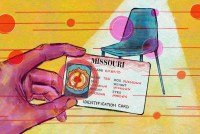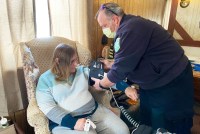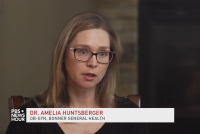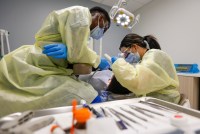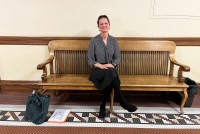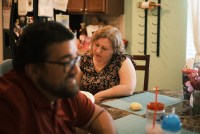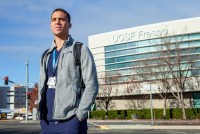Latest KFF Health News Stories
In Idaho, Taking a Minor Out of State for an Abortion Is Now a Crime: ‘Abortion Trafficking’
Under the nation’s first law of its kind, teens must have parental consent to travel for medical care, including in cases of sexual assault or rape. Any adult, including an aunt, grandparent, or sibling, convicted of violating the criminal statute faces up to five years in prison — and could be sued for financial damages.
Can a Fetus Be an Employee? States Are Testing the Boundaries of Personhood After ‘Dobbs’
Laws granting rights to unborn children have spread in the decades since the U.S. and Missouri supreme courts allowed Missouri’s definition of life as beginning at conception to stand. Now, a wrongful death lawsuit involving a workplace accident shows how sprawling those laws — often intended to curb abortion — have become.
Lead Contamination Surfaces in Affluent Atlanta Neighborhood
The Environmental Protection Agency recently confirmed high lead levels in an upscale Atlanta neighborhood. The location stands in contrast to many polluted sites investigated by the federal Superfund program — often in former industrial or waste disposal areas where environmental racism has left marginalized groups at risk.
Montana Passes Significant Health Policy Changes in Controversial Session
The recently ended legislative session was marked by Medicaid reimbursement hikes, abortion restrictions, anti-LGBTQ+ statutes, behavioral health spending, and workforce and insurance measures.
Colorado Becomes the First State to Ban So-Called Abortion Pill Reversals
The controversial practice of administering progesterone to people after they have taken the abortion pill mifepristone may be coming to an end in Colorado. Pills have emerged as the latest front in the war over abortion since the U.S. Supreme Court overturned Roe v. Wade last summer.
Biden Administration Issues New Warning About Medical Credit Cards
Americans paid an estimated $1 billion in deferred interest on medical debt in just three years, the Consumer Financial Protection Bureau reports. The agency warns against medical credit cards, which are often pitched right in doctors’ offices.
Federal Rules Don’t Require Period Product Ingredients on Packaging Labels. States Are Stepping In.
New York and California have passed laws requiring disclosure of ingredients on menstrual product packaging. Advocates want more transparency across the U.S.
Community Paramedics Don’t Wait for an Emergency to Visit Rural Patients at Home
Community paramedicine is expanding nationwide, including in rural areas, as health care providers, insurers, and state governments recognize its potential to improve health and save money.
The Nation’s Health Secretary Has This Doctor on Call
Carolina Reyes, a physician who specializes in high-risk pregnancies, says providers and health systems have a role in tackling systemic racism. She’s also married to U.S. Health and Human Services Secretary Xavier Becerra.
After Idaho’s Strict Abortion Ban, OB-GYNs Stage a Quick Exodus
At least two Idaho hospitals are ending labor and delivery services, with one citing the state’s “legal and political climate” and noting that “recruiting replacements will be extraordinarily difficult” as doctors leave.
Listen: How Are States Spending Money From the Opioid Settlements? It’s Not Easy to Know
KFF Health News senior correspondent Aneri Pattani appeared on NPR’s “1A” on May 1 to discuss issues related to how opioid settlement funds are being distributed.
Millions Are Stuck in Dental Deserts, With No Access to Oral Health Care
Vulnerable and marginalized communities are getting left behind in dental deserts, where patient volume exceeds provider capacity or too few dentists are willing to serve the uninsured or those on Medicaid.
For California Teen, Coverage of Early Psychosis Treatment Proved a Lifesaver
A Medi-Cal patient illustrates how early schizophrenia treatments can yield big benefits. Advocates want California to expand such services to more people living with severe mental illness, which they argue will not only improve lives but also save money over time.
Journalists Discuss Enduring Effects of Long Covid and Handling of Opioid Settlement Funds
KFF Health News and California Healthline staff made the rounds on national and local media this week to discuss their stories. Here’s a collection of their appearances.
Montana Considers Requiring Insurance to Cover Fertility Preservation for Cancer Patients
Young cancer patients must act quickly to preserve their sperm and eggs once they get their diagnosis, and many can’t afford the cost.
As US Life Expectancy Falls, Experts Cite the Health Impacts of Incarceration
In a nation with one of the highest incarceration rates in the world, imprisonment speeds the aging process, research shows. Some experts complain the federal government isn’t collecting or releasing data that could identify disease patterns and prevent deaths.
Expectant Mom Needed $15,000 Overnight to Save Her Twins
Doctors rushed a pregnant woman to a surgeon who charged thousands upfront just to see her. The case reveals a gap in medical billing protections for those with rare, specialized conditions.
As Federal Emergency Declaration Expires, the Picture of the Pandemic Grows Fuzzier
The pandemic gave federal officials expanded power to access crucial data about the spread of covid-19, but that authority will change when the public health emergency sunsets in May. That, along with the end of popular covid trackers, will make it harder for policymakers and the public to keep an eye on covid and other threats.
How a 2019 Florida Law Catalyzed a Hospital-Building Boom
In Wesley Chapel, Fla., near Tampa, residents will soon have three general hospitals within a five-minute drive. The new construction is part of a hospital-building boom across Florida unleashed almost four years ago, when the state dropped a requirement that companies obtain government approval to open new hospitals.
Programa forma médicos multiculturales, pero no siempre ejercen en áreas vulnerables
Investigadores han descubierto que el programa ha logrado diversificar la inscripción, pero no hay suficiente seguimiento a largo plazo para saber si estos graduados ejercen en las regiones donde más se necesitan.




